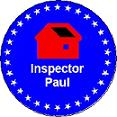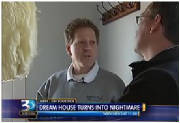 PSI: Homeowners say county inspectors missed
code violations by Jamie Boll | produced by
Jeff Keene MONROE, NC (WBTV) - In the quiet of Union County farm country Heather and Lee
Henage built the house they always wanted. "The outside looks great," said Lee Henage. It
turns out looks can be deceiving. "What we've discovered is underneath that, the bones
of the house, there are problems," said Henage. Piers that support the weight of the
house are missing. "It's not going to be easy, or inexpensive for them for them to correct,"
said Paul King, a certified home inspector. "It poses a structural instability problem." Engineers
hired by the Henages put together a detailed report and found dozens of structural and safety issues. The
windows in the children's upstairs bedroom are 46" off the floor. Fire code says they can only be 44" off
the floor to provide an exit in an emergency. There are other issues found in the home's crawl
space. Straps designed to keep the frame of the house connected to the foundation aren't installed correctly.
It could cause problems in a strong windstorm. "Yes, I would be nervous about that,"
said King. The most serious of the problems were backed up in a report by investigators with
the North Carolina Office of the State Fire Marshal. It points out "life safety issues" and code violations. "We
thought the house is passing inspections it must be structurally sound," said Heather Henage. King
says Union County code inspectors should have been able to spot the problems. "At a framing
stage yes, it should have been caught," said King. The violations weren't caught.
Union County inspector Greg Capehart kept passing the home. The Henages are now suing him and the Union County Inspections
Department. Capehart has not returned WBTV's calls for comment. Union County Inspection
Department Director John Reavis also declined to comment citing the pending lawsuit. In its response to the court, the
county says it did nothing wrong. The Henages say they've gotten nowhere with the builder
Tsitouris Homes and dismissed it from a lawsuit because the company is no longer in business. Just
before the Henage home was finished, the state was wrapping up another investigation. It found Capehart guilty of "willful
misconduct, gross negligence, or gross incompetence" for failing to enforce code provision on a different home. Capehart
did not admit guilt in the case, but he did agree to a 3 month suspension of his license. "Just
infuriating to me that the county is denying that they did anything wrong," said Heather Henage. "Yet they
know that they guy who inspected my house has done the same thing before." "You
sink all your savings and future income to buy a house." said Lee Henage. "And put it on your family property
and it's devastating." The Fire Marshal Office's final report on the Henage home is expected
to in the next couple weeks. It will then be determined if Capehart will face any state ordered discipline. As of right
now he is still doing inspections in Union County. The Henages say repairs to their home will
cost $162,000. Their lawsuit is still working its way through the legal system. King
says homeowners should consider hiring an inspector at the framing stage to catch problems before drywall and insulation goes
up. But he says most people don't because they rely on county inspectors to pick up code violations.
| Charlotte Hardwood Floor Issue |
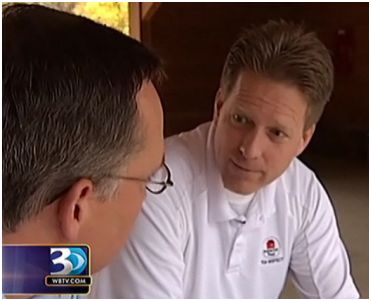
|
CHARLOTTE, NC (WBTV) - Robert Peploski and
his wife built their retirement home in 2006. They wanted one big upgrade from their builder, hardwood floors throughout
most of the house. He loved what he saw when they moved in. "I said wow," said Peploski. "Hardwood
floors have really come a long way." A few months later though problems began popping up. The glue used to
secure the floor to the concrete slab didn't adhere properly in some places. "This area was replaced," said
Peploski pointing near the kitchen. "They took this area out," he said pointing in another direction. During
those repairs he noticed something else. "I found out it wasn't hardwood floors." said Peploski. It
turns out it wasn't solid hardwood flooring. He instead got engineered hardwood. "It's based on the fact
that you've got several different layers of wood here that are glued together," said Paul King a certified home inspector. King
said to buy and install the product Pepolski received should have cost around $4 per square foot. Peploski paid three
times that price, $8596 for 700 square feet. "He paid way too much," said King. "Paid way
too much." Peploski said when signed the contract for his house with homebuilder DR Horton no one said anything
about engineered hardwood. "No, had they said engineered flooring is all they would put in I would have never agreed
to it," said Peploski. A WBTV producer visited a DR Horton model home and asked questions typical of a potential
home buyer. He asked repeatedly about the hardwood flooring. Not once did the salesperson say anything about engineered
versus hardwood flooring. The salesperson only said it was pre-finished. Pre-finished can come in both solid and
hardwood floors. "Anybody should be straightforward and up front and tell you what you are getting," said
King. WBTV left several messages, on the phone and in person trying to get official comment from DR Horton about its
pricing and how it represents its wood flooring. No one has gotten back to us. "Trying to get this resolved
with the company is like banging your head against the wall," said Peploski. DR Horton has told Peploski in writing
that is willing to make repairs to the problem spots. Peploski would just like it removed and he wants his money back. It's
unlikely to happen because technically engineered hardwood is considered a hardwood. The kind Peploski received however is
very thin and unlike a solid hardwood will be very difficult to sand and repair later. King says it's important to see
samples before installation to know exactly what you are getting. He also suggests you get outside quotes on pricing.
He says upgrades are where builders make some of their biggest profit margins. Click the red camera on the right to
watch a WBTV web extra. Paul King explains some of the differences in wood flooring.
BBB: Inspect foreclosed
homes before buying  04:25 PM EDT on Thursday,
October 15, 2009 By BOBBY SISK
/ NewsChannel 36
E-mail Bobby: BSisk@WCNC.com Video October 15th, 2009 Inspect foreclosed homes before
buying CHARLOTTE, N.C. -- Real estate auctions are becoming more popular these days. While it may be a chance for you to
get a great buy, you should do your homework first. "It's a water access community on Mountain Island Lake,"
said realtor Sandy Coyer, showing a home in Mount Holly that sits on more than an acre of land. "It's five bedrooms and
five and a half baths." The home originally sold for $700,000. "Our current auction list price is
424,900," said Coyer. "The bank understands the market." And so does Coyer. "I've been doing
foreclosures since the year 2000," she said. New for her this year, Coyer is turning to auction companies, like
Texas-based Hudson and Marshall, to get properties that have sat on the market sold. "You buy it as is,"
Coyer said. No contingencies. No repairs. That's why Janet Hart with the Better Business Bureau says you should check
out foreclosure properties before buying. "You certainly can drive by, walk around the house," Hart said.
And if you're still interested, pay for a home inspection. "It's going to cost you probably $300 to $500
to have that done but it could turn up some really big problems you can't see," Hart said. For even more peace
of mind, Coyer says ask your realtor for a competitive market analysis to make sure a good investment is as good as you think.
"To know that even though it's a good price for today's market, it is going to be a good price two or three years
down the road," Coyer said. Also, check out the company conducting the auction. You can do that with the Better
Business Bureau. Hudson and Marshall has an "A" plus rating and only one complaint in the past three years.
| Chinese Drywall Dangers |
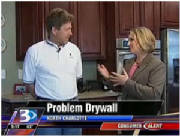
|
Questions about dangerous drywall
March 27, 2009 05:03 PM EDT
March 27, 2009 05:46 PM EDT
|
|
 |
 |
|
|
|
|
By Kristen Miranda - bio l email
Posted By Jeff Rivenbark email
CHARLOTTE, NC (WBTV) - It's a problem that's estimated to impact about 60-thousand homes nationwide.
It's hard to detect and even harder to fix.
Thousands of homes built or remodeled since 2004 have proven to have a problem with the drywall used inside.
Typically it's drywall imported from China and it's causing foul odors, corrosion of copper wiring and pipes, and sometimes
gives homeowners breathing problems.
Experts say the compounds used in the drywall react differently than that made in the USA and put off gasses.
Those gasses cause the smell, or react with the metals in the wiring, to cause the problems.
Drywall not already installed is easy to check for country of origin, there should be a stamp on one side.
Unfortunately, if the drywall is already up and painted over, it's hard to know from where it came.
While most people won't have a problem, if you're worried, check for that foul odor, for lights or appliances that
aren't working properly, or for mold or mildew issues.
Click the video link here on this page to watch as a home inspector walks us through a newly built home.
Area homes could be at risk for water damage
Posted:
Feb 18, 2009 02:30 PM EST
Updated:
March 18, 2009 12:01 AM EDT
By Jamie Boll -
Produced by Jeffrey Keene -
CHARLOTTE, NC (WBTV) - Brian Jones would seem to be an unlikely victim of a water damaged home.
He's a homebuilder in the Charlotte area and after years of building other people's dreams he decided to build his own.
About a year after moving into his York County home he noticed water damage in his dining room.
"I do this for a living for other folks and all of the sudden you get an issue like this that you don't expect," said Jones.
Jones is now stuck with a $3,000 dollar repair bill.
Certified Home Inspector Paul King says the problem was with the installation of a popular home exterior product.
"I can honestly say that 95% of the time it's not installed properly," said King.
Click the red camera to watch this Problem Solver Investigation.
<script type='text/javascript' src='http://www.wbtv.com/global/video/videoplayer.js?rnd=283676;hostDomain=www.wbtv.com;playerWidth=610;playerHeight=400;isShowIcon=true;clipId=3560925;playerType=STANDARD_EMBEDDEDscript'></script>
Leaky pipes could land homeowners money for repairs 
06:31 PM EST on Monday, January 26, 2009
By NewsChannel 36 Staff
E-mail Us: NEWS@WCNC.com
Video
January 26th, 2009
Leaky pipes could land homeowners money for repairs  More News video More News video
CHARLOTTE, N.C. -- No one wants to have leaky pipes, but for a lot of homeowners in Charlotte, it's a big problem and a
costly one. But you could be entitled to money to help fix it through a $1 billion class action settlement.
Paul King has earned a living the last 20 years inspecting homes in Charlotte.
"If you could talk to 10 homeowners, you would find one in 10 that has probably had a major plumping problem," he said.
A major problem like pipes bursting, causing thousands of dollars in property damage.
"It's widely installed on any home in this area built in the early 80s through 1995 or 1996, so that's a lot of homes in
the Charlotte area," King said.
The problem is the kind of piping used. It's called polybutylene. Known as PB pipe, it's a non-rigid, usually gray or black
plastic resin pipe
"It tends to leak at the fittings," King said.

Polybutylene pipes He knows firsthand. A loud noise from the kitchen sink tipped him off to his own pipes bursting.
"I shut the water down and I could hear water flowing below me and I said, 'Uh oh,'" King said.
He was lucky because his only damage was the plumber's bill.
Under terms of the settlement, homeowners who experience leaks within a certain timeframe can have their pipes replaced
for free.
"Do I want to go through the process of re-piping the house? I don't know. I'm thinking about it," said King.
Jan. 31, 2009, is the final deadline to file a claim with the Consumer Plumbing Recovery Center in Plano, Texas, which
is the court-established administrator of the lawsuit settlement.
To learn more about whether you're eligible to file, contact the CPRC at 1-800-392-7591 or visit www.pbpipe.com.
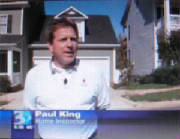
In the Line of Fire
With land values increasing, developers are doing all they can to maximize space.
Building two homes on a lot instead of one means a bigger profit but with it comes added dangers.
All over the Charlotte region, new homes are being crammed onto smaller lots.
In some cases, homeowners can practically reach out the window and touch their neighbor's home.
These tight quarters could leave you in the line of fire. If your neighbor's house catches on fire, it could very likely
spread to a portion of your house.
Anchor Jame Boll has more details in this report. Press on the picture above to "PLAY" to this story.
Proposed Change Could Affect Home Inspection Reports
Buying a home is the biggest investment most people will ever make. Before you purchase a home, you should have
the house inspected to determine potential safety issues.
Proposed changes to home inspection reports could make it more difficult for you to understand those issues.
Paul King is a home inspector in the Charlotte area. His job involves crawling through every nook and cranny,
looking for things that are broken, missing or leaking.
"A home inspector goes through a house to make sure the house is safe," King told WBTV.
At the end of a home inspector's report, you will find a summary including things that "adversely affects the habitability
of the dwelling" or potential safety issues.
As Anchor Jamie Boll reports, a proposed change in state regulations may eliminate this summary. Press "PLAY" below
to see this story.
6NEWS Investigators: Home sick home
pt. 3
06:11 AM EST on Tuesday, February 21, 2006
By JEFF SONIER / 6NEWS
E-mail Jeff: JSonier@WCNC.com

6NEWS
House inspector Paul King said the mold problems in Hunter Oaks were more severe than what the
builder reported. 6NEWS investigators were back in the neighborhood where several families said mold in their houses made them sick and forced
them to move out.
Now 6NEWS talked with a home inspector who said what he saw made him afraid of getting sick himself. The neighborhood
is Hunter Oaks, off Rea Road in Union County, just over the Mecklenburg County line.
The area we're talking about in Hunter Oaks is Mossington Lane.
So far, 6NEWS talked with the former home owners, we've talked with the home builder, and we’ve talked with
the soil experts about it.
Now the home inspector who's actually been underneath and seen it for himself says the problem with mold was a lot worse
than we were told.
Paul King was looking for trouble. That's what a home inspector does. But after what this inspector saw at homes in Hunter
Oaks last year -- the moldy crawl spaces of the houses here, the health problems of the families here King started worrying
about his own health.
"And you can't help but think in the back of your mind if it's doing this to somebody else, if I continue to put myself
in this environment, is it going to do it to me, too?" King said.
King investigated for mold in three different houses at Hunter Oaks. The same houses where whole families got sick. The
same houses Ryland homes bought back from the families for more than $1 million. The same houses where Ryland told 6NEWS the
mold was limited.
"It was less than one square foot of mold in the crawl space," said Ryland Homes President David Nelson.
“And how does that compare with what you saw?" 6NEWS asked King.
"There was definitely more than one square foot of mold," said King.
"If you have a mold level in a house that's causing somebody living in that house to be sick, you have
a problem "
King said it's all right here in his home inspection report for one Hunter Oaks house -- pictures from the crawl space
and all.
"On the bottom of these joists you can see a fuzzy like substance,” said King. "All that fuzz there is some mold."
"How unusual is it to find that much growth in so many places?" 6NEWS asked.
"With a house with that much water under it, it's not unusual at all," King said.
Other findings from King's report show a virtual breeding ground for mold with humidity above 90 percent in the crawl space,
and standing water in the foundation.
6NEWS: "Grading, poor. Gutters, poor. Crawl space, poor,"
KING: "Yeah, actually (the home) have a large pond of water sitting up against the side of the house, near the crawl
space door," King said. "(And) you're pulling whatever's in the crawl space up in the house."
King's inspection report also differs with how Ryland describes mold levels inside the homes.
"There were no elevated levels of mold inside the homes at all," Nelson said.
But King showed 6NEWS the equipment he used to measure mold inside those Hunter Oaks homes, and the numbers he got -- mold
numbers a lot higher than Ryland's.
“And if the numbers are high?” 6NEWS asked.
"If the numbers are high, then it's glaringly apparent that you've got a problem that's not going to affect just one person,
but affect several people," said King.
And while Ryland has denied, from the beginning, that these rashes and other health problems were mold-related…
"You don't see any connection between the illnesses of the families and the time they lived in those houses with the mold
in the crawl space," 6NEWS asked.
"We've seen no evidence of that, Jeff," Nelson said.
This 6NEWS investigation has already shown handwritten notes and letters from doctors that say the neighbors they treated
really did get sick from mold in their home. King said it's what home inspectors call sick building syndrome.
"If you have a mold level in a house that's causing somebody living in that house to be sick, you have a problem," King
said.
Ryland, meanwhile, said they haven't seen the inspectors report so they can't respond to it.
They've also said from the beginning that whatever problems those houses did have with mold or moisture have since been
fixed.
6NEWS also did a little research on sick building syndrome. The federal EPA's own website describes it as a situation where
people get sick when they're in a building, and get better when they're away from the building, which is exactly how the families
who lived in those houses described what happened to them.
The EPA website also lists mold that grows near standing water as one possible cause of sick building syndrome.
Monday, Oct 22, 2007
Posted on Mon, Oct. 22, 2007
Home buyers may lose advice
GREG LACOUR AND MIKE TORRALBA
Some N.C. home inspectors are upset over a controversial new rule that would limit the amount of information
they can include in their summary reports to home buyers.
Most prospective buyers hire an inspector to make sure the house has no hidden problems. An inspection report can top 30
pages, with key findings highlighted in a summary.
Under the change, expected to be adopted next month by the N.C. Home Inspectors Licensure Board, summaries could refer
to structural and safety problems -- but couldn't recommend how to fix them.
Critics say that will make it harder for buyers to understand what's wrong with their homes. They say the change was pushed
by real estate agents who want a quick, easy sale. The N.C. Association of Realtors says it supports the new rule, but didn't
propose it.
"What ends up happening is that a person trying to buy a house is going through one of the most tense situations in his
entire life," said Paul King, a Fort Mill, S.C.-based inspector. "They get the 35-page home inspection report and there's
a summary, so what are they going to do? They're not going to read the 35-page report; they're going to read the two-page
report."
The board member who proposed the change, Jim Liles, said the board was trying to standardize forms inspectors use to make
them easier for real estate agents, buyers and sellers to understand. Critics overstate the effects of the change, he said.
Inspectors still would be allowed to make safety recommendations in the full report, he said, and could refer to them in the
summary.
Gerald Canipe, board chairman and a Fayetteville home inspector, said he understands the arguments for it but he opposes
the change.
While it would lead to quicker sales negotiations, he said, taking recommendations out of summaries would be a conflict
of interest "because the home inspector is representing the buyer."
The licensure board voted 5-3 to approve the rule in September and expects to adopt the change Nov. 9. It would then go
before a state rules commission in December. The General Assembly could intervene if 10 or more people object after the rules
commission approves it.
One veteran Charlotte inspector said he doesn't think the change will alter much. Inspection reports generally warn buyers
that the summary is just that, and failure to read the entire report is no excuse if something goes wrong later, said Bob
Boucek, who owns Beech Home Inspections.
"A summary is a summary, not the whole thing," Boucek said. "You need to read the rest of the report to get the whole breadth
of the inspection."
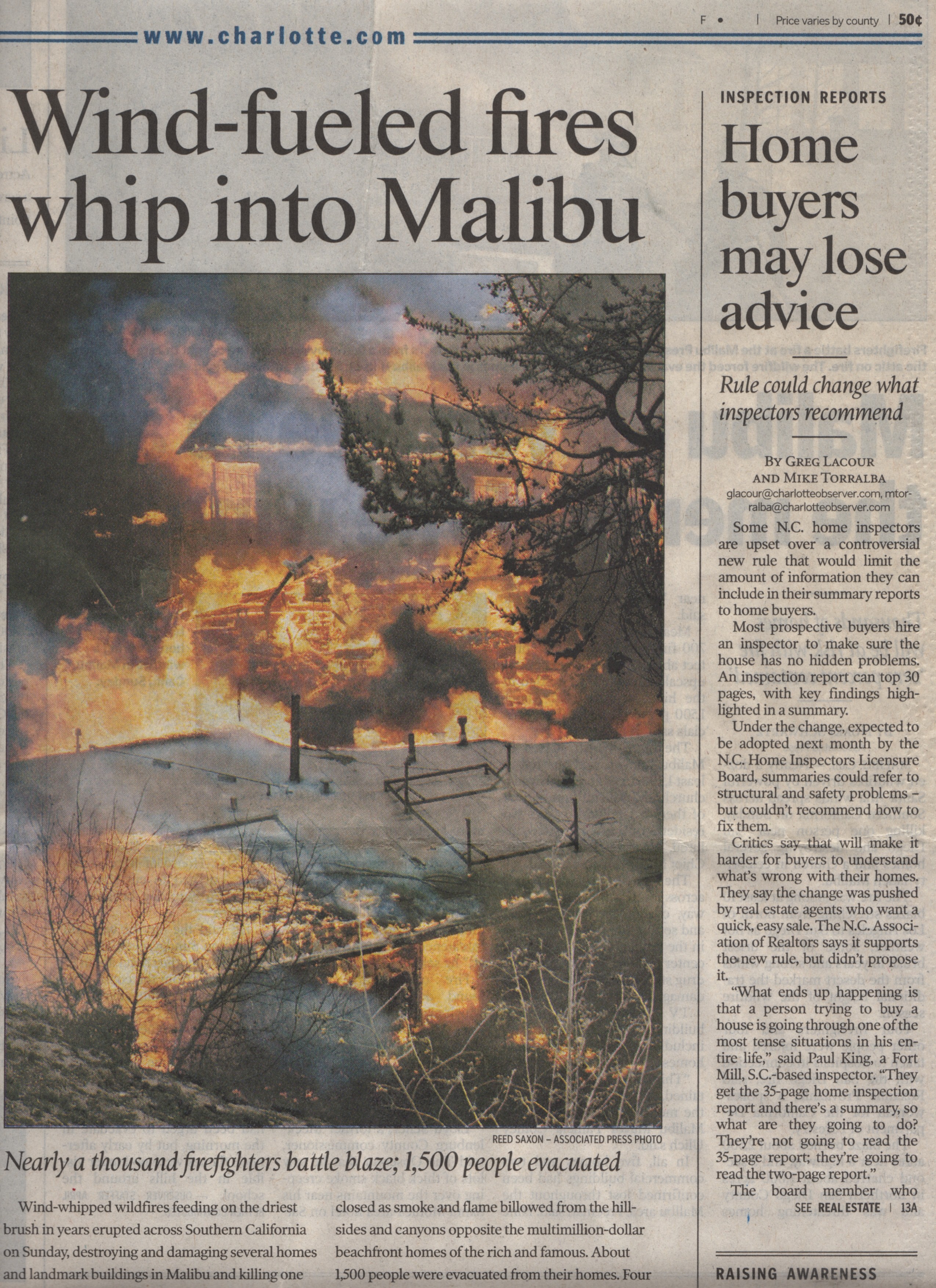
|
| Charlotte Observer Article |
|
